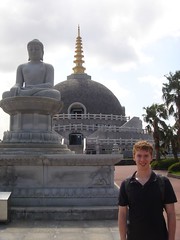I have heard that hysterical women say
They are sick of the palette and fiddle-bow.
Of poets that are always gay,
For everybody knows or else should know
That if nothing drastic is done
Aeroplane and Zeppelin will come out.
Pitch like King Billy bomb-balls in
Until the town lie beaten flat.
All perform their tragic play,
There struts Hamlet, there is Lear,
That's Ophelia, that Cordelia;
Yet they, should the last scene be there,
The great stage curtain about to drop,
If worthy their prominent part in the play,
Do not break up their lines to weep.
They know that Hamlet and Lear are gay;
Gaiety transfiguring all that dread.
All men have aimed at, found and lost;
Black out; Heaven blazing into the head:
Tragedy wrought to its uttermost.
Though Hamlet rambles and Lear rages,
And all the drop-scenes drop at once
Upon a hundred thousand stages,
It cannot grow by an inch or an ounce.
On their own feet they came, or On shipboard,'
Camel-back; horse-back, ass-back, mule-back,
Old civilisations put to the sword.
Then they and their wisdom went to rack:
No handiwork of Callimachus,
Who handled marble as if it were bronze,
Made draperies that seemed to rise
When sea-wind swept the corner, stands;
His long lamp-chimney shaped like the stem
Of a slender palm, stood but a day;
All things fall and are built again,
And those that build them again are gay.
Two Chinamen, behind them a third,
Are carved in lapis lazuli,
Over them flies a long-legged bird,
A symbol of longevity;
The third, doubtless a serving-man,
Carries a musical instrument.
Every discoloration of the stone,
Every accidental crack or dent,
Seems a water-course or an avalanche,
Or lofty slope where it still snows
Though doubtless plum or cherry-branch
Sweetens the little half-way house
Those Chinamen climb towards, and I
Delight to imagine them seated there;
There, on the mountain and the sky,
On all the tragic scene they stare.
One asks for mournful melodies;
Accomplished fingers begin to play.
Their eyes mid many wrinkles, their eyes,
Their ancient, glittering eyes, are gay.
Subscribe to:
Post Comments (Atom)

"I don't believe people are looking for the meaning of life as much as they are looking for the experience of being alive." ~ Joseph Campbell
www.flickr.com
This is a Flickr badge showing public photos from deep ochre. Make your own badge here.


2 comments:
Henry,
It's very interesting that you chose to post this poem.
I first read this poem in college, and I have picked it up every so often since then.
I find this one of Yeats' finest poems, for its vivid imagery, and his willingness to take on the subjects of immortality and impermanence.
Since I first watched "Joseph Campbell and the Power of Myth" in 1988, Yeats' use of the word "gay" throughout the poem, in it's old meaning of "happy" or "joyful" reminds me of Campbell's quote from Buddhist philosophy "Joyful participation in the sorrows of the world."
"All life is sorrowful; there is however an escape from sorrow; the escape is Nirvana – which is a state of mind or consciousness, not a place somewhere, like heaven. It is right here, in the midst of the turmoil of life. It is the state you find when you are no longer driven to live by compelling desires, fears, and social commitments, when you have found your center of freedom and can act by choice out of that. Voluntary action out of this center is the action of the bodhisattvas – joyful participation in the sorrows of the world. "
To me, the old men's eyes in the carving are glittering gaily because they have learned to practice "radical acceptance", to face life at it's root (or radix) and act without attachment to the outcome.
Yes, this poem stirs a lot within me, and I'm so glad you posted it!
Dad, that's amazing that you have such a strong connection to this poem! I found it by accident, actually. I had printed out the Heart Sutra to bring with me on a recent overnight hiking trip (one folded piece of computer paper fits well inside my ukulele case), but with the rain the paper dissolved (impermanence!) and I was googling the site to print out another copy.
http://www.lapislazulitexts.com/translations.html
As I was typing in the search I noticed that "Lapis Lazuli" was a Yeats poem so I decided to check it out. I wonder if the translators are referencing Yeats in the title of their site? Likely so!
I like Yeat's focus on art as a means of transcendence, from the Shakespearean actors portraying their tragic characters but not getting drawn into depression (indeed reveling in the beauty of the tragedy) and the twinkling eyes of the Chinese sages as they hear the mournful chords of an instrument (maybe a uke?) on the way up to perhaps a temple on the side of a mountain.
Thanks for sending the Joseph Campbell quote. I've copied it into one of my most sacred documents on my computer, one that I review often, his words capture so well the signposts I hope to guide my life, I'd like to let his words ferment in my mind and see what brews.
The joyful, gay acceptance of life's sorrows, the smiling amidst the chaos, yes!
Post a Comment